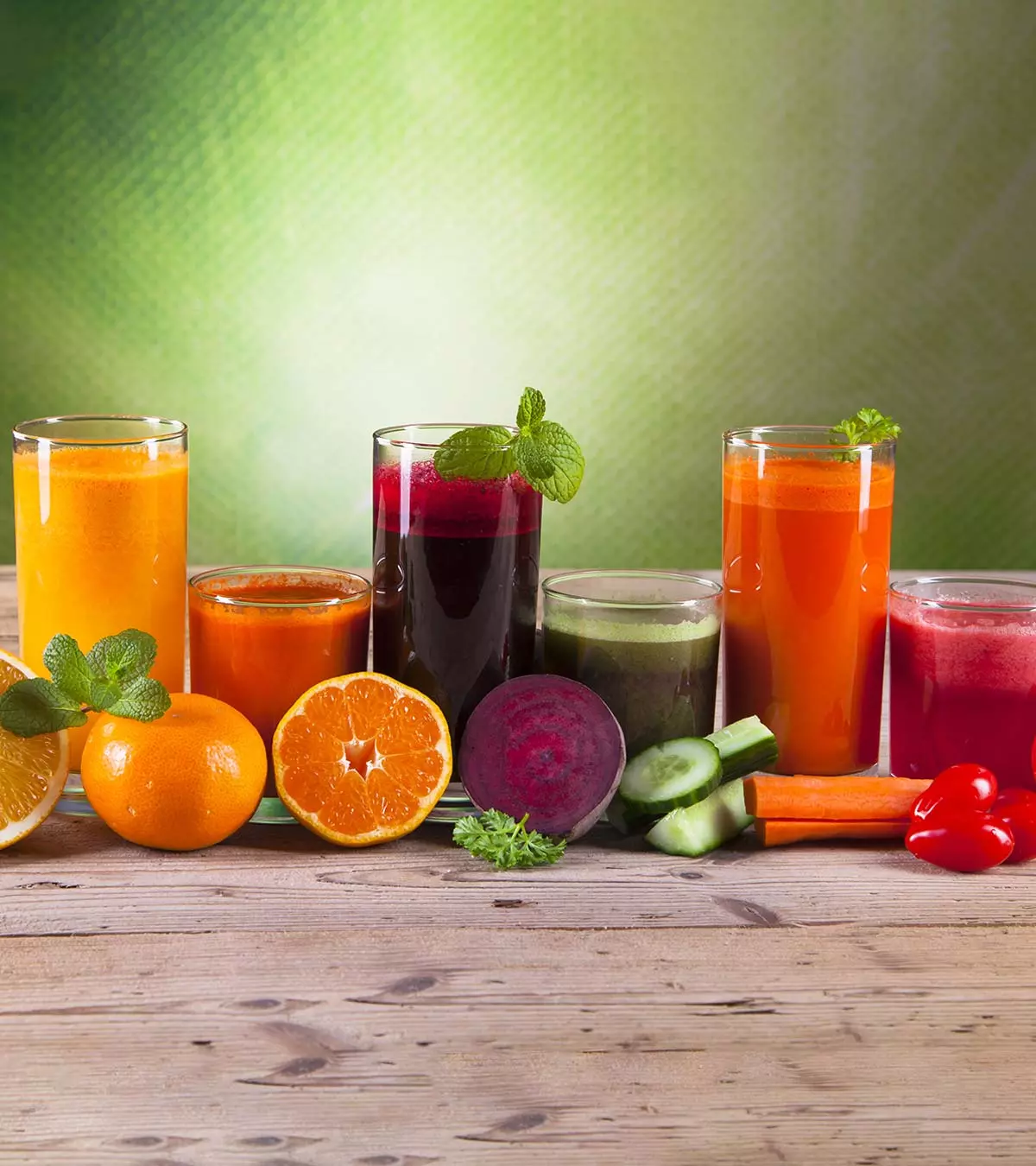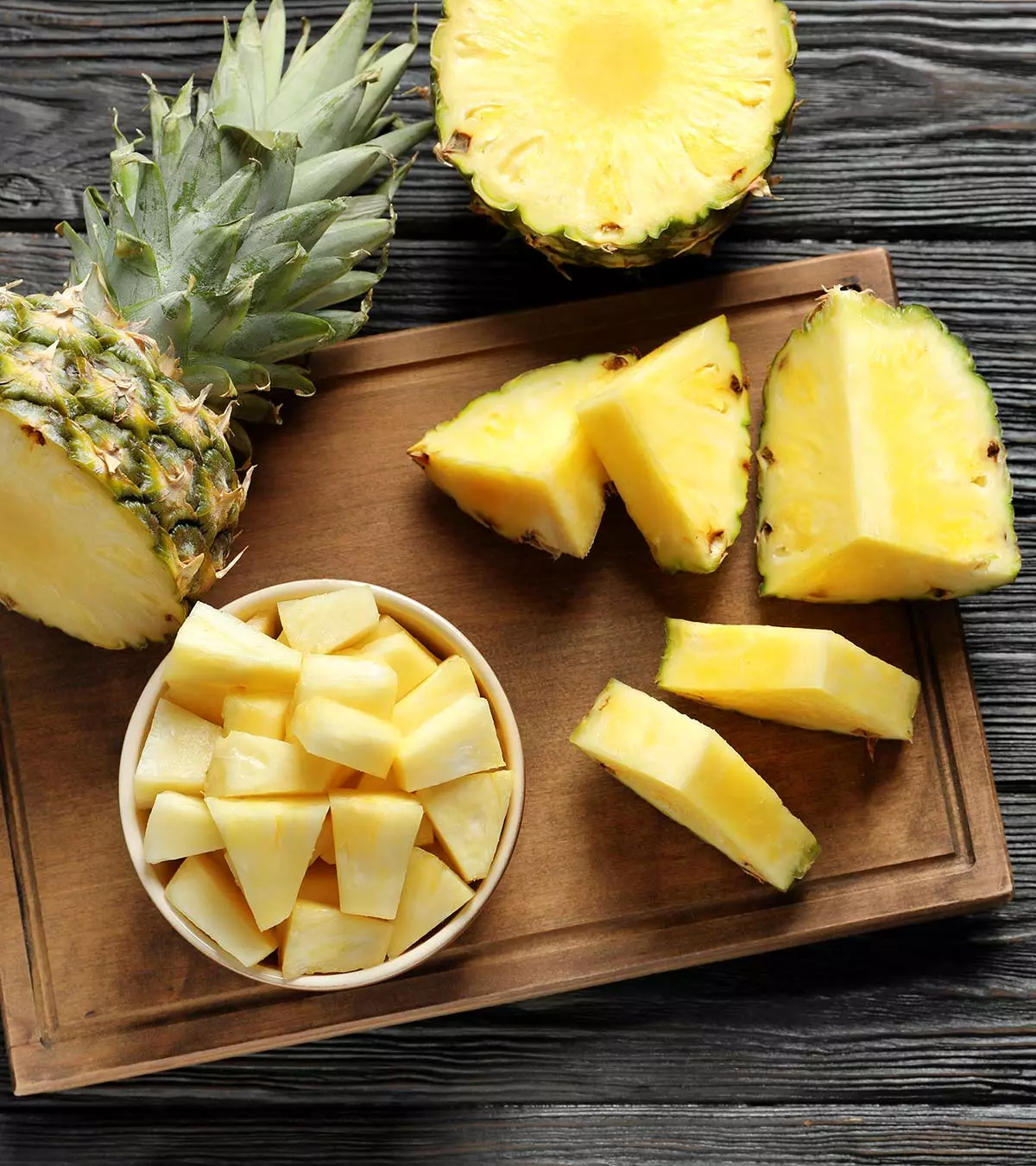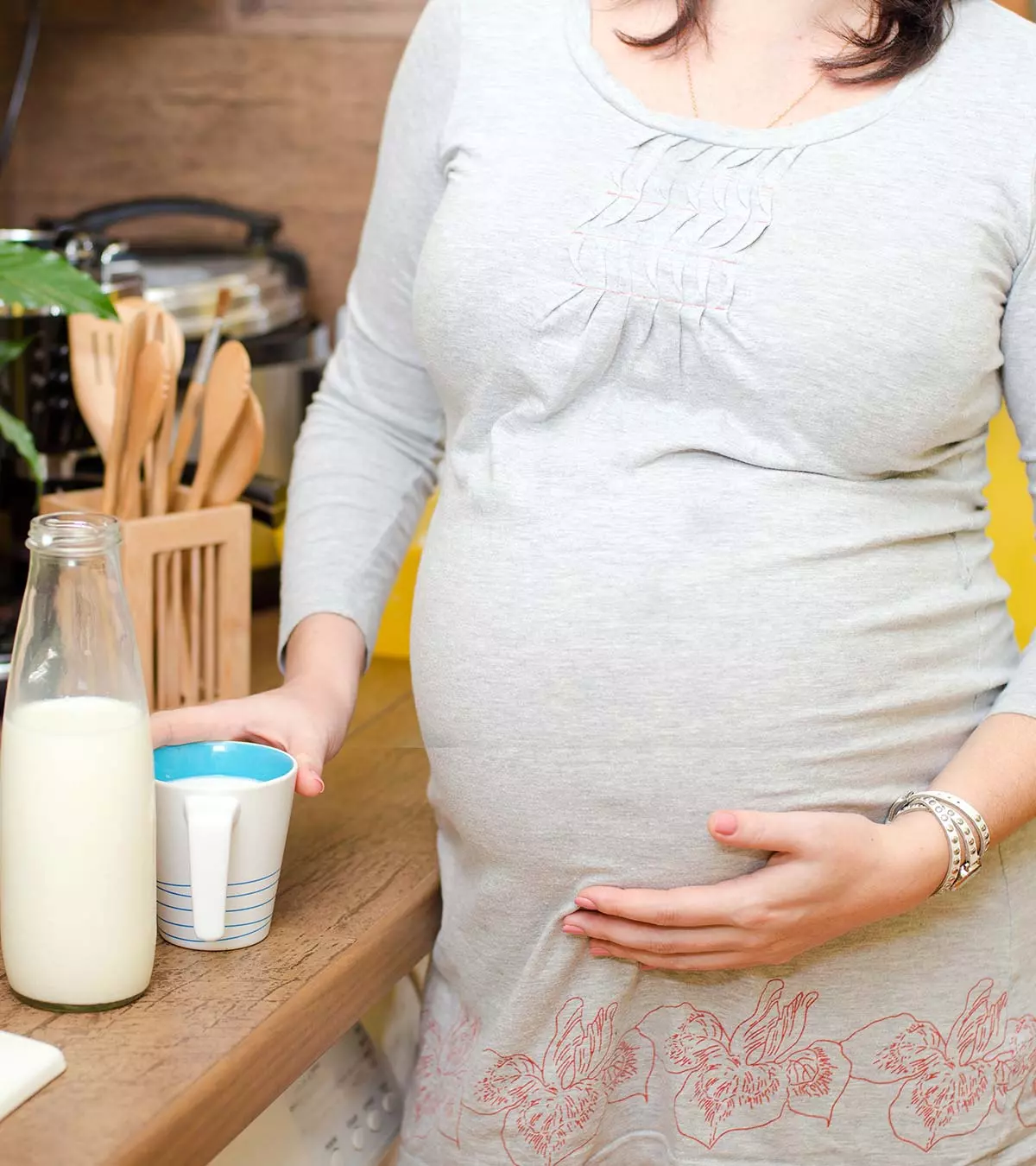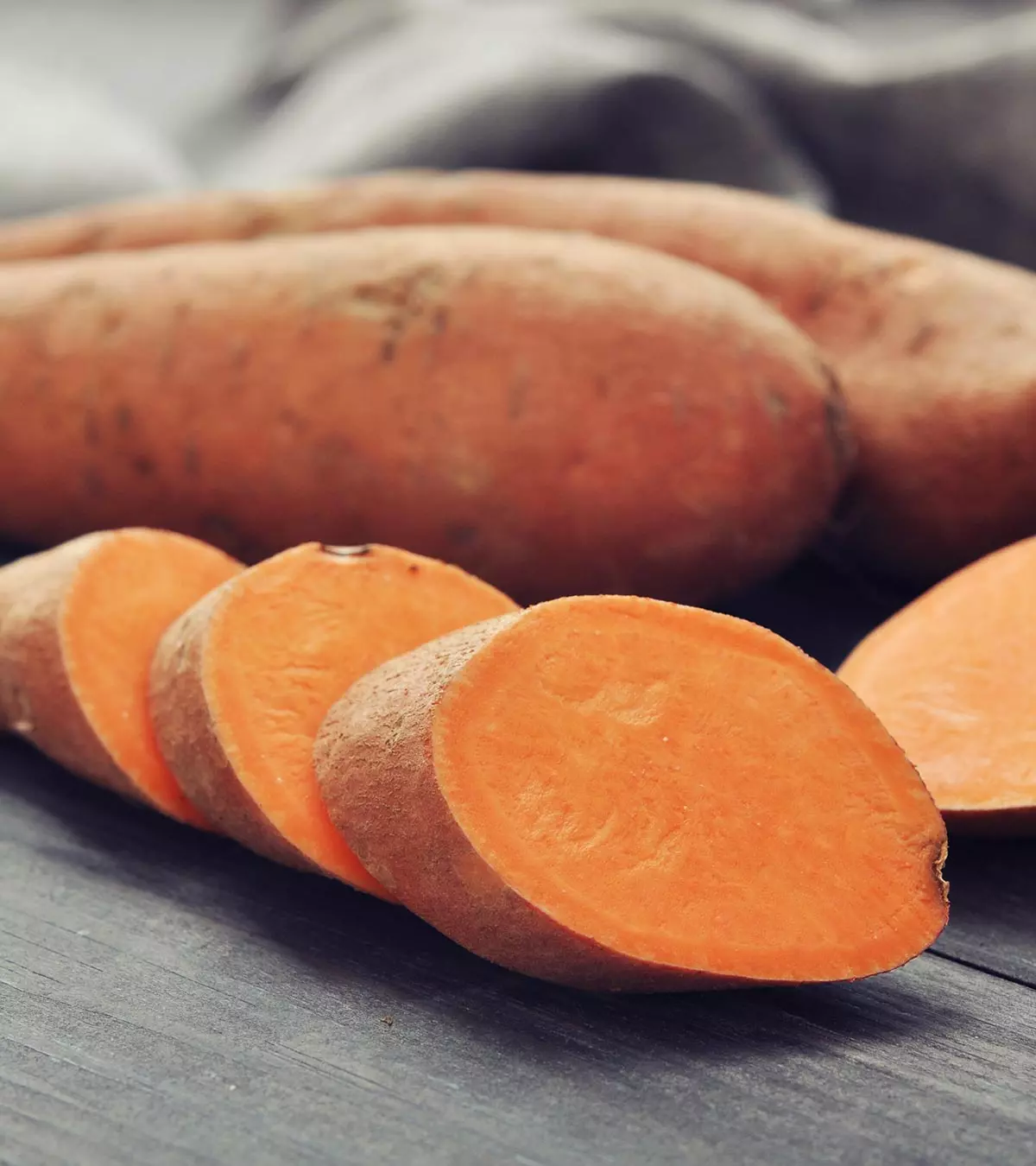
Image: ShutterStock
Is it safe to eat lettuce during pregnancy? A mere mention of green, fresh, and crisp lettuce may be appetizing for salad lovers. Lettuce is a versatile vegetable that helps add fiber to your meal without compromising the taste. If you are keen on following healthy eating practices while pregnant, lettuce can be included in the list of must-haves. Safety is paramount during pregnancy, and ensuring all food items are properly washed, cooked, and stored can greatly reduce the risk of foodborne illnesses. While it is known that salad greens should be added to one’s diet when expecting, read this post to know the health benefits and safety measures to be followed while eating lettuce when pregnant.

Key Pointers
- Lettuce is highly nutritious and beneficial for pregnant women’s health.
- Lettuce helps promote digestion and sleep and boosts immunity.
- The folate present in lettuce helps prevent congenital disabilities.
- When consuming during pregnancy, the leaves should be thoroughly washed to prevent infections.
- Lettuce can be consumed raw in salads or cooked in various dishes as a part of a balanced pregnancy diet.
- However, overconsumption of lettuce may cause allergies and anaphylaxis during pregnancy.
What Is Lettuce?

Lettuce, scientifically popular as Lactuca sativa, is a useful vegetable native to Egypt. The plant is popular for its unique religious and cultural significance in ancient Egypt. However, today you can find the plant in several parts of the world. Lettuce possesses several nutrients and has many health benefits. Therefore, you might include it in moderation as part of your pregnancy diet along with other vegetables and grains.
Genki Kitty, a mother who is also vegan, shares on her blog how she enjoyed lettuce during her pregnancy, “My favorite foods lately have been super loaded salads. For me, a loaded salad is a plate filled with the first layer of organic mixed red leaf lettuce, a type of bean/legume/tofu/etc. protein, a grain such as rice or quinoa, then a homemade salad dressing or hummus topping (ⅰ).’’
Can You Eat Lettuce During Pregnancy?
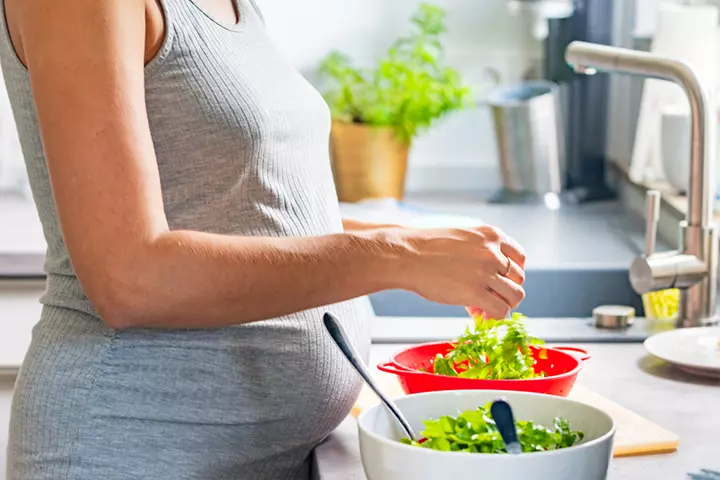
You can enjoy eating lettuce salad during pregnancy. However, wash the leafy greens thoroughly before you eat them. Unwashed lettuce may contain certain parasites and bacteria that cause foodborne illnesses, such as ListeriaiA genus of bacteria that enter the human body via contaminated food and is responsible for food poisoning. and Salmonella. Between 2014 and 2025, the US Centers for Disease Control and Prevention (US CDC) received reports of 78 foodborne disease outbreaks that were linked to leafy greens, primarily lettuce. To safeguard your health, it is recommended to rinse individual leaves under running water, as this is considered the best way to wash them thoroughly (1).
10 Health Benefits Of Lettuce During Pregnancy
Eating lettuce not only satisfies your food craving during pregnancy but also offers you several health benefits. Here are some benefits of eating lettuce during pregnancy.
1. Prevents birth defects
Lettuce contains a good amount of minerals, such as calcium, and vitamins that helps ensure optimum prenatal health. Vitamin B9, also known as folate or folic acid, helps prevent the risk of birth defectsiAbnormalities that can affect any part of the body and have been present since birth. during pregnancy (2). Vitamin K, on the other hand, reduces the risk of hemorrhagingiThe uncontrolled loss of blood or any other fluid, internally or externally. , and it passes through the placenta, supporting unborn baby’s development (3).
 Quick fact
Quick fact2. Promotes digestion

The fiber content of lettuce can help improve digestive health and prevent constipation hazards during pregnancy. The vegetable also contains chloride that aids digestion and normalizes body fluids effectively (4).
3. Promotes sound sleep
Lettuce acts as a natural sleep inducer and helps you have continuous, sound sleep during pregnancy
. The vegetable blocks excitatory signal processes of your neural and muscular tissues and promotes relaxation while expecting (5).
4. Reduces cholesterol levels
Lettuce helps regulate your cholesterol levels and prevents the risk of heart-related problems and strokes during pregnancy.
5. Anti-cancer benefits
The phytonutrients in fresh lettuce leaves are highly beneficial for preventing the growth and development of cancer. So, the consumption of vegetables during pregnancy may safeguard you from some types of cancer (6).
6. Alleviates inflammation
Lettuce provides anti-inflammatory benefits that aid in mitigating inflammation during pregnancy.
Fresh extracts of lettuce minimize harmful inflammation resulting due to carrageenaniIt is a substance constituted of polysaccharides and extracted from edible red seaweeds. It is used as a thickening agent in several food items. and lipoxygenaseiAn enzyme that is used to catalyze the oxidation of polyunsaturated fatty acids by oxygen. (7).
7. Protects from microbial infections
The latex of lettuce provides you with powerful antimicrobial benefits. The vegetable helps you get rid of Candida albicans and safeguards you from harmful microbial infections effectively (8).
8. Minimizes anxiety
Lettuce offers a sedating effect and helps reduce your stress and anxiety to a great extent during pregnancy (5).
9. Boosts immunity
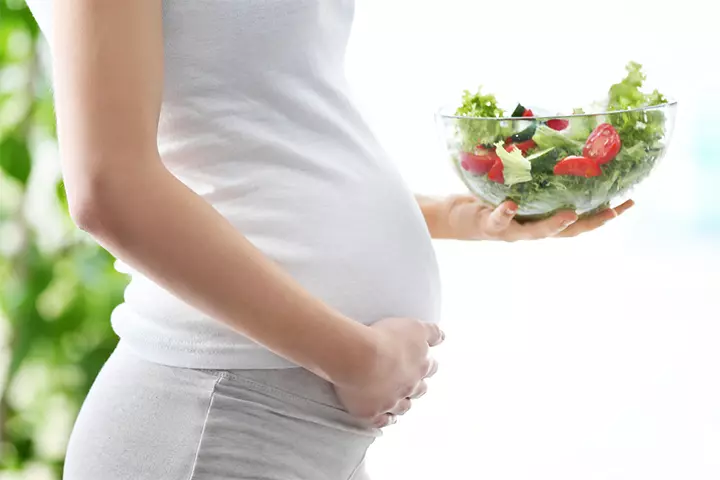
Lettuce contains lots of antioxidants that help neutralize free radicals and prevent cell, tissue, and DNA damage during pregnancy. The antioxidant content of this crunchy salad green can help strengthen the immune system and prevent the risk of the development of harmful diseases and disorders (9).
10. Hydration
Lettuce has a high water content, which helps keep you hydrated and supports overall health during pregnancy. The lettuce variety with the most water content is iceberg lettuce at 96 percent followed by romaine lettuce at 94 percent (16).
 Quick fact
Quick factA Word Of Caution:
Excess consumption of lettuce in pregnancy may make you suffer from food allergies. Unregulated consumption of lettuce can also lead to anaphylaxis that may affect your health adversely. So, make sure you add appropriate amounts of lettuce to your regular diet after consulting your doctor.
Practical Tips for Eating Lettuce Safely During Pregnancy
While lettuce consumption is safe during pregnancy, one must know how to choose, store, and cook this ingredient. Here are a few tips to consider while consuming lettuce.
- Consider buying fresh organic lettuce with crisp and vibrant leaves without any signs of wilting.
- Avoid consuming prepackaged lettuce and precut lettuce from buffets or salad bars.
- Rinse lettuce under cold running water to remove dirt and any potential contaminants, even if it is labeled as pre-washed.
- Keep lettuce in the refrigerator and consume it within a few days to reduce the risk of bacterial growth.
Frequently Asked Questions
1. Can you eat pre-packaged lettuce when pregnant?
No. Eating pre-packaged or pre-packed salads, including lettuce, is not advised during pregnancy because of the increased risk of listeria contamination in these foods (10).
2. Can lettuce help control weight gain during pregnancy?
Like other leafy vegetables, lettuce is low-calorie and has zero fat and cholesterol (11). Therefore, its intake as a part of a calorie-balanced diet may help avoid unwanted pregnancy weight gain.
3. What are the ways to include lettuce in a pregnancy diet?
You can include lettuce in your pregnancy diet as lettuce soup, salad, wraps, layered in spring rolls, and toppings over a spread.
4. Can you have lettuce from the microwave when pregnant?
When used appropriately, microwave use has no adverse effects on the quality of lettuce (12). Generally, microwaving lettuce isn’t common, but if you are heating or cooking it as a part of a dish, ensure it is properly heated or cooked.
5. Is there any prescribed amount of lettuce to limit while pregnant?
No. There is no prescribed amount for eating lettuce while pregnant, but you should eat lettuce in moderation as a part of a well-balanced pregnancy diet.
Infographic: Advantages Of Including Lettuce In Your Pregnancy Diet
Lettuce types such as iceberg, romaine, green leaf, red leaf, and butterhead contain essential nutritional properties that may be useful for pregnancy. However, it’s best to take a doctor’s opinion and check for allergies prior to inclusion in your pregnancy diet. The following infographic presents a list of benefits of consuming lettuce during pregnancy.
Some thing wrong with infographic shortcode. please verify shortcode syntax
Illustration: Is It Safe To Eat Lettuce During Pregnancy?

Image: Stable Diffusion/MomJunction Design Team
Watch this informative video to discover the relevant information regarding consuming romaine lettuce during pregnancy.
Personal Experience: Source
MomJunction articles include first-hand experiences to provide you with better insights through real-life narratives. Here are the sources of personal accounts referenced in this article.
ⅰ. Week 31: Vegan twin pregnancy update.https://genkikitty.wordpress.com/2017/05/12/week-31-vegan-twin-pregnancy-update/
References
- Guide to Washing Fresh Produce.
https://www.nifa.usda.gov/sites/default/files/resource/Guide%20to%20Washing%20Fresh%20Produce508.pdf - Madelene Johansson et al.; (2007); Folates in lettuce: a pilot study.
https://www.ncbi.nlm.nih.gov/pmc/articles/PMC2606989/ - Vitamin K.
https://hsph.harvard.edu/department/nutrition/ - Salad greens: Getting the most bang for the bite.
https://www.health.harvard.edu/staying-healthy/salad-greens-getting-the-most-bang-for-the-bite - Hae Dun Kim et al.; (2017); Sleep-inducing effect of lettuce (Lactuca sativa) varieties on pentobarbital-induced sleep.
https://www.ncbi.nlm.nih.gov/pmc/articles/PMC6049580/ - Health Benefits and Safe Handling of Salad Greens.
https://extension.colostate.edu/topic-areas/nutrition-food-safety-health/health-benefits-and-safe-handling-of-salad-greens-9-373/ - 11 Fantastic Foods That Reduce Inflammation Naturally.
https://www.goodnet.org/articles/11-fantastic-foods-that-reduce-inflammation-naturally - Jasmina Zdravkovic et al.; (2012); Antimicrobial activity of lettuce (Lactuca sativa L.) extract grown in plastic and glasshouses.
https://www.researchgate.net/publication/267033683_Antimicrobial_activity_of_lettuce_Lactuca_sativa_L_extract_grown_in_plastic_and_glasshouses - Hyun-Ju Seo and Jin Boo; (2025); JeongImmune-Enhancing Effects of Green Lettuce (Lactuca sativa L.) Extracts through the TLR4-MAPK/NF-κB Signaling Pathways in RAW264.7 Macrophage Cells.
https://cdn.apub.kr/journalsite/sites/kjpr/2025-033-03/N0820330304/N0820330304.pdf - Melanie McGrice; (2018); Foods to avoid during pregnancy.
https://www1.racgp.org.au/newsgp/clinical/foods-to-avoid-during-pregnancy - Lettuce green leaf raw.
https://fdc.nal.usda.gov/fdc-app.html#/food-details/169249/nutrients - Laura J. Billiter; (2009); Effect of Microwave Radiation on Chlorophyll.
https://csef.usc.edu/History/2009/Projects/S0404.pdf - Benefits Of Red Leaf Lettuces.
https://www.narayanahealth.org/blog/benefits-of-red-leaf-lettuces - Lettuce Nutrition.
https://lettuceinfo.org/lettuce-nutrition/ - 25 water-rich foods to help you stay hydrated this summer.
https://utswmed.org/medblog/hydrating-healthy-foods/
Community Experiences
Join the conversation and become a part of our nurturing community! Share your stories, experiences, and insights to connect with fellow parents.
Read full bio of Dr. Kire Stojkovski
Read full bio of Ria Saha
Read full bio of Swati Patwal
Read full bio of Lorraine Teron






